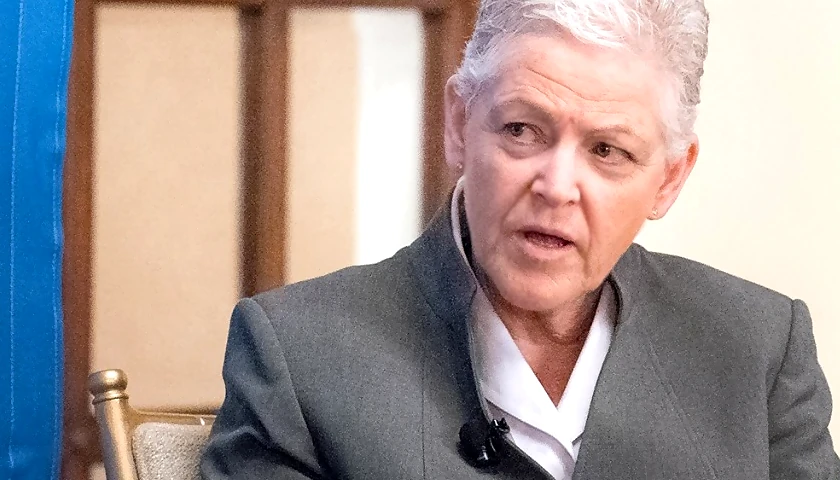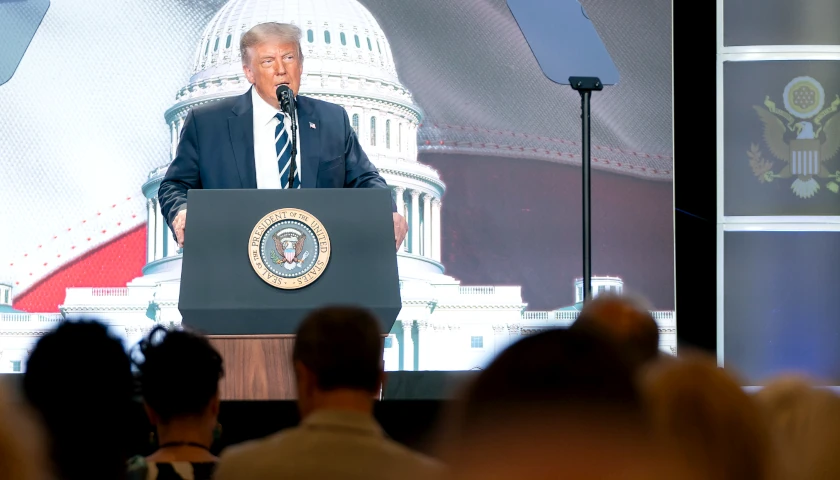by Kevin Killough
Former EPA administrator and climate advisor Gina McCarthy was a key backer of the Inflation Reduction Act (IRA). The law set the country on an aggressive march toward greenhouse gas emission reductions, including advancing wind and solar. By some estimates, the green energy credits in the law alone will cost $3 trillion over their lifetimes.
Despite the expense, McCarthy appeared to suggest on a recent episode of the Bloomberg “ESG Currents” podcast that there was some poor planning with regards to the impact the expansion of wind and solar would have on the grid.
Bloomberg Intelligence analyst Gail Glazerman asked McCarthy, in hindsight, if there was anything she’d do differently with regard to the law.
“I think, at least me personally, I may have underestimated the grid challenges. And I think that’s proven to be sort of universally understood now … We expected it would be successful. We didn’t expect, you know, over 600 projects already being started now. And there’s huge amounts of manufacturing, you know, being being invested in. So there’s, there’s a lot more energy, clean energy, in this course of two and a half years or so than we anticipated in this short window of time,” McCarthy said.
In its push to expand intermittent wind and solar energy on the grid, the Biden-Harris administration has been criticized for not properly assessing the impacts the buildout would have on grid reliability and affordability. Green manufacturing investments tapping into IRA subsidies have also come under fire for poor results and questionable connections to China.
“Absolute disaster”
“What she’s [McCarthy] alluding to when she talks about the problems onboarding ‘green’ energy to the grid is a euphemism for the *absolute disaster* of adding intermittent sources of generation to an electrical grid that requires CONSISTENT electrical generation to keep the lights on,” Will Hild, executive director of Consumers’ Research, said in a post on X.
McCarthy also discussed the permitting challenges to expanding transmission capacity on the grid. Since wind and solar farms require large amounts of land, investments in transmission lines to connect disparate generators spread out over thousands of miles to the grid are needed.
This presented another challenge, McCarthy said in the interview, due to the permitting involved with transmission projects. Permitting a single high-voltage transmission line is an arduous task. For example, the $3 billion, 700-mile Transwest Express transmission line, which will connect a large wind farm in Wyoming to consumers in other states, took 15 years to get the approval for construction to begin. The construction is estimated to take another five years.
“I think we face a significant moment to start looking at how we expedite those permits and how we do it in a way that’s again, fair and equitable, so people have a sense of what’s coming an opportunity to speak and be and reconcile to themselves whether or not this is a good project or not. Right? But we have to move forward with expedited permitting,” McCarthy said.
Problems with permits
Among the biggest opponents of permitting reform are environmentalists who advocate for the energy transition. Sen. Joe Manchin, I-W.V., and Sen. John Barrasso, R-Wyo., introduced the Energy Permitting Reform Act of 2024, with the goal of expediting permitting of a variety of energy projects, including transmission, mining of green critical minerals, and transmission lines.
“A giveaway”
The Natural Resource Defense Council is among the most vocal critics of the bill because it treats energy sources equally. The NRDC said in a statement that the bill would limit “opportunities for communities to challenge projects.”
“This bill is a giveaway for the oil and gas industry that will ramp up drilling and environmental destruction at a time when we need to be putting a hard stop to fossil fuels,” Alexandra Adams, managing director of government affairs at NRDC, said in the statement.
In a briefing, EarthJustice said the bill would “shift the balance of power away from communities, the environment, and the clean energy future, giving the mining industry even greater control over public lands than they already enjoy under the regressive 1872 Mining Law.”
So far, the bill has not been heard on the Senate floor.
– – –
Kevin Killough is a reporter at Just the News.
Photo “Gina McCarthy” by Gina McCarthy.





